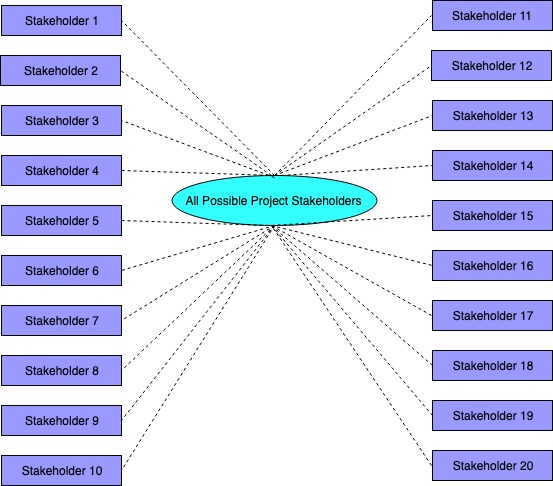Stakeholder Management Processes in Projects
Fraino12345 (Talk | contribs) |
Fraino12345 (Talk | contribs) (→Stakeholder Analysis) |
||
| Line 28: | Line 28: | ||
Once the identification process is clear and all stakeholders are found and named, the stakeholder analysis can begin. This includes four parameters: | Once the identification process is clear and all stakeholders are found and named, the stakeholder analysis can begin. This includes four parameters: | ||
| − | 1 | + | 1. POWER. Stakeholder’s authority level |
| − | 2 | + | |
| − | 3 | + | 2. INTEREST. Concern regarding the project outcomes |
| − | 4 | + | |
| + | 3. INFLUENCE. Active involvement in the project | ||
| + | |||
| + | 4. IMPACT. The ability to effect changes to planning or execution | ||
== Stakeholder Engagement == | == Stakeholder Engagement == | ||
Revision as of 23:37, 11 February 2019
Abstract
A stakeholder manager is an essential element for a prosperous project, program or portfolio. A stakeholder is an individual who will or can be affected by the aforementioned aspects. Thus, stakeholder management considers how the relationship between stakeholders can be affected and what processes can mitigate altercations. Stakeholder management processes are fundamental through businesses, organisations and projects, a set of strategies were developed to analyse stakeholders. The goals for the stakeholder management processes are to:
- Maximise supportive stakeholder engagement
- Ensure the processes are understood by all stakeholders
- Introduce multiple key principles and processes for different stakeholder situations
Contents |
Stakeholder Identification
Before the management can begin with multiple processes within a project, an identification is essential. The identification includes an initial brainstorm investigating all stakeholders who are potentially affected by any decision throughout the project. Stakeholders can be businesses, companies, individuals or educational industries; therefore, spending a sufficient amount of time on the identification process is fundamental. The following questions should be asked during the brainstorming session to embark on the identification process:
- Who is the suppler of the project?
- Who is the customer?
- Who influences the main stakeholders?
- Who can be affected by the project?
- Who is working towards solving the project?
- Who has the decisions over resources?
- Who is ultimately in charge of the success of the project?
Once these questions have been answered, the stakeholders can be classified and analysed.
Stakeholder Analysis
Once the identification process is clear and all stakeholders are found and named, the stakeholder analysis can begin. This includes four parameters:
1. POWER. Stakeholder’s authority level
2. INTEREST. Concern regarding the project outcomes
3. INFLUENCE. Active involvement in the project
4. IMPACT. The ability to effect changes to planning or execution
